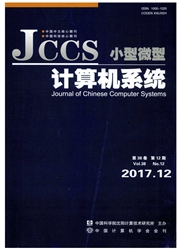

 中文摘要:
中文摘要:
群搜索优化算法把群体中的个体分为三种角色:发现者,加入者和游荡者.算法选择最优个体作为唯一的发现者,采用随机决策策略分配加入者和游荡者.该策略过于盲目,算法性能也较差.针对这一缺点,本文考虑个体与发现者的分布关系,以发现者为球心,聚集在球心(或圆心)周围的个体均为加入者,散布于球外的个体为游荡者.而球的半径大小的确定,提出两种不同的方法:自适应半径策略和固定加入者个体数量策略.前者取个体到发现者的平均距离的K倍作为球的半径,后者规定离发现者最近的一定数量的个体被认为分布于球内的加入者.通过实验表明,这两种策略提高了种群多样性的同时,还保证了算法快速收敛到最优解.
 英文摘要:
英文摘要:
Group Search Optimizer (GSO) assumes that group members include producers, scroungers and rangers. The algorithm of- ten chooses the best member as the producer. However, the Group Search Optimizer applies random strategy for the role assignment of scrounger and ranger, which is a blind search and leads to bad results. So, based on the spatial distribution between the members and the producer, we assume that all individuals inside the sphere with producer as the center are scroungers and rangers are ones out- side the sphere. In order to determine the radiu of the sphere, we propose two new methods: strategy of self-adaptation radius and strategy of fixed scrounger number. The former method takes k times of the average distance from the members to the producer as the radius of the sphere. The latter one assumes that certain indviduals with the nearest distance from producer are scourngers. Results shows that the novel algorithms achieve faster convergence and improve the diversity of individuals.
 同期刊论文项目
同期刊论文项目
 同项目期刊论文
同项目期刊论文
 Video Image Segmentation using Gaussian Mixture Models based on the Differential Evolution-based Par
Video Image Segmentation using Gaussian Mixture Models based on the Differential Evolution-based Par 期刊信息
期刊信息
